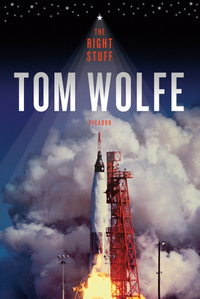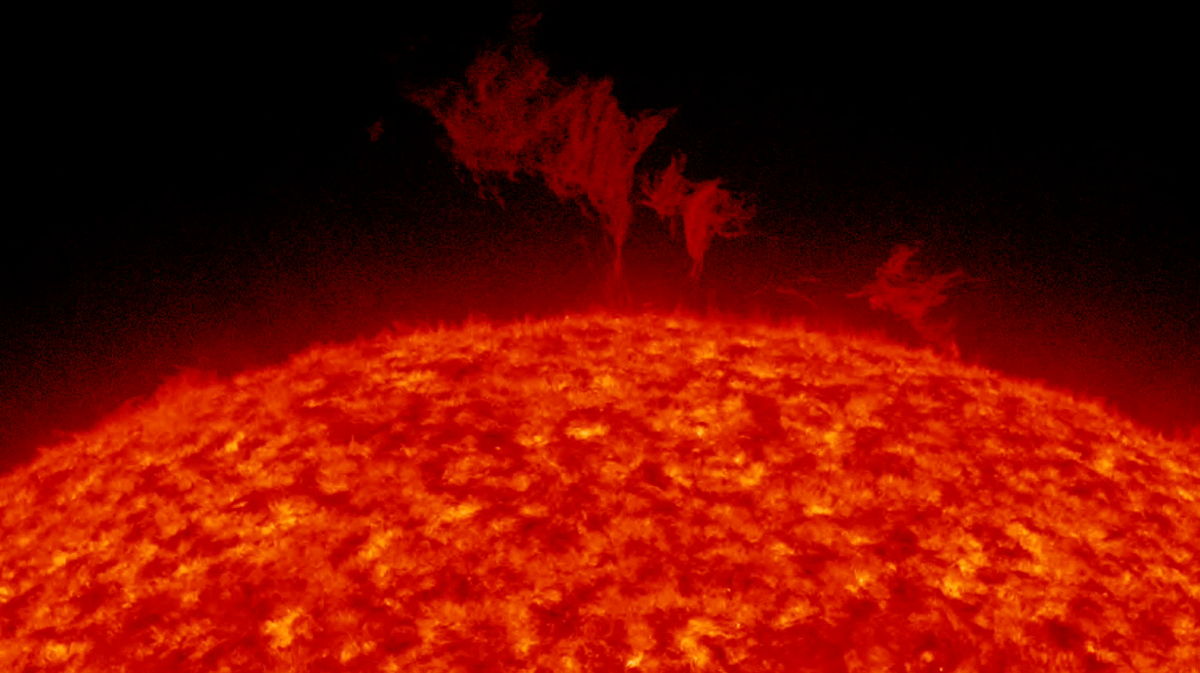'The Right Stuff' recap: Meet the Mercury 7 astronauts — 'Sierra Hotel' and 'Goodies'
"The Right Stuff" lifts off with a countdown to a liftoff.
"The Right Stuff" lifts off with a countdown to a liftoff.
Now streaming on Disney Plus, National Geographic's "The Right Stuff" tells the story of NASA's original Mercury astronauts, based on Tom Wolfe's 1979 bestselling book and the 1983 film adaptation by the same title. The show launched on Friday (Oct. 9) with the first two hours of the eight-episode series.
Warning: What follows contains spoilers for the first two episodes, "Sierra Hotel" and "Goodies" on Disney Plus. Skip ahead to the end of the article if you only want to read about the real space history portrayed on screen.
Related: These astronauts read 'The Right Stuff' and flew in space
- Want to try Disney Plus? You can get a 7-day free trial here
- Sign up for Disney Plus for $6.99/month
Episode 1: Sierra Hotel

The series opens with the sound of a ticking clock, foreshadowing the countdown that is already underway. It is predawn at Cape Canaveral, Florida, on May 5, 1961, when we first see John Glenn (Patrick J. Adams) and Alan Shepard (Jake McDorman) getting started for the day — going for a run and shaving — and the tension between them is clear.
"It's a big deal, a day like today," Glenn says, as he and Shepard sit down for a breakfast of steak and eggs. "Man has got to think about what he is going to say, you know? Got to have something good, something memorable."
After a beat, Shepard replies.
Get the Space.com Newsletter
Breaking space news, the latest updates on rocket launches, skywatching events and more!
"You're a great pilot, John, one of the best. I have no doubt you're going to make a good astronaut. But you went behind my back and I know all about it. So we're going to go out there and turn up the wattage for the cameras and all, but right now, we don't have to sit here and pretend like we're best buddies, not even on a day like today," he says.
"And no," Shepard adds, "man should not be thinking about what he is going to say. Man should be thinking about what he going to do. And right now? What I am doing is enjoying my breakfast and I'd like to eat in some damn peace and quiet."
Related: The Mercury 7 Astronauts: NASA's First Space Travelers
A voiceover by a news reporter sets up the next scene, set on Pad 5, where a Mercury-Redstone rocket stands ready for its pilot. NASA has yet to disclose to the public who will be the nation's first astronaut and though it it is strongly implied to be Shepard by the prior exchange, the silvery-spacesuited astronaut who emerges into the still fog-laden night air can only be seen from behind as he looks upward at his ride into history.
The countdown continues to tick down, as spectators gather around televisions and at area beaches. The men in Mercury Mission Control take to their consoles. And, set against a mostly blue sky, the Redstone glints in the sunlight as the last seconds tick off. "Five, four, three, two, one "
Fade to black and the series flashes back two years to 1959.
After a night of too many drinks at the local watering hole, Gordon Cooper (Colin O'Donoghue) awakes on his living room floor, apparently having fallen through a glass coffee table and cut open his hand. A shower and a bandage later, he is suited up and heading out to the flight line at Edwards Air Force Base in California.
Flying chase for his drinking buddy and fellow test pilot Cal Cunnigham, Cooper takes to the sky in the cockpit of an F-104 "Starfighter" supersonic jet.
Meanwhile, across the country in Langley, Virginia, Glynn Lunney (Jackson Pace) is lost. He is looking for the Space Task Group, where director Bob Gilruth (Patrick Fischler) and Chris Kraft (Eric Ladin) are awaiting a list of names.
The two scenes now alternate, with Cooper struggling to fly with a bleeding hand, and Gilruth explaining to the younger Lunney why the list is already out of date.
"Every trade has its occupational quirks. Lawyers cheat on their spouses, politicians take bribes, writers like to drink..."
Related: Project Mercury, NASA's first crewed space program
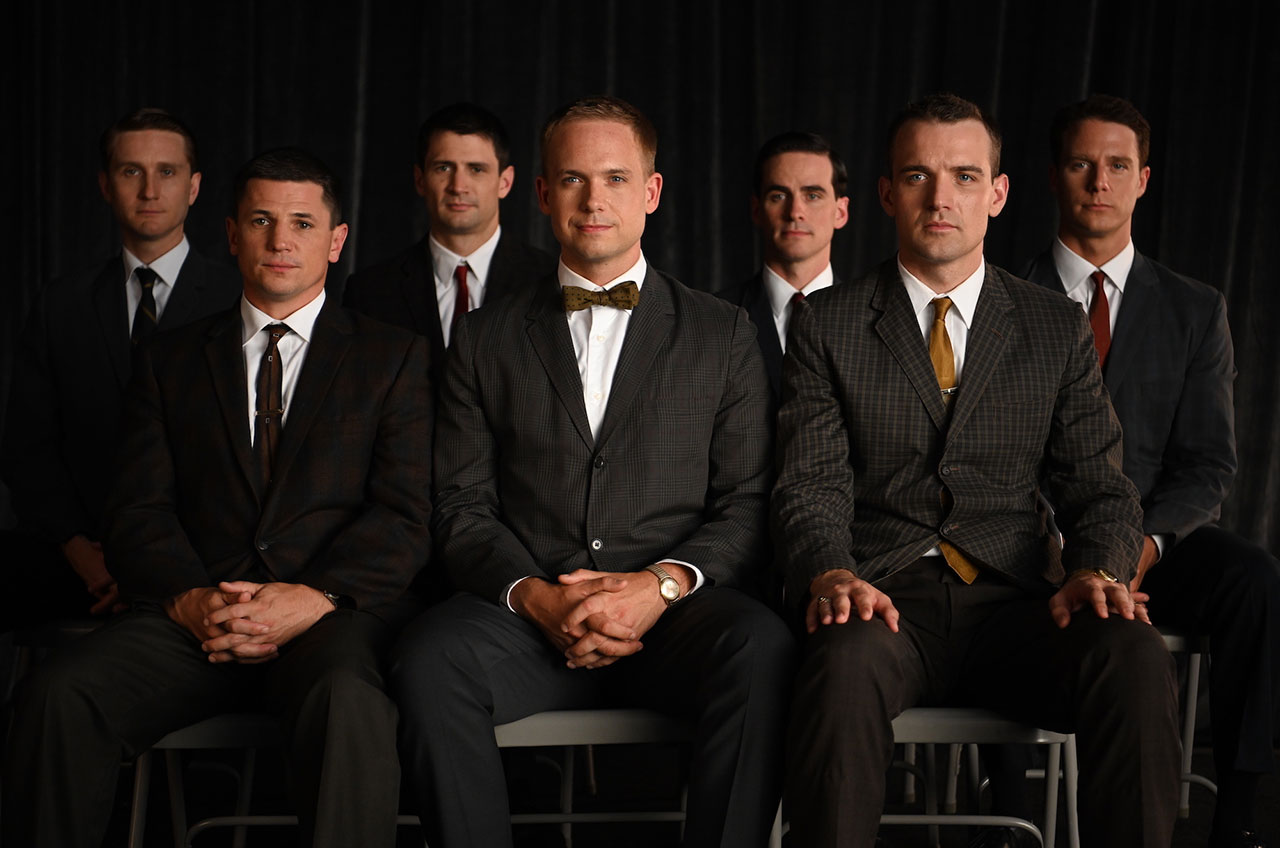
Deciding to push his Starfighter to the limit, Cunningham banks hard left, loses control and slams his head into the canopy. Unresponsive to Cooper's desperate calls for him to eject, Cunningham's F-104 tumbles as it plunges to the ground.
"...test pilots have a particularly odd habit. A lot of them die," says Gilruth, as he crosses off Cunningham's name from the list.
At 38 years old, John Glenn has already achieved fame. He has made the cover of a magazine for a record-setting jet flight and appeared on a national game show. The Marine is at the top of his flying career, but he complains to a coworker that he has no where to go but up ... to space.
Alan Shepard is also pining for more flight time, a desire he first expresses to the naked lady in his bed, notably not his wife, before taking it up with his superior in the Navy.
With Cunningham's death still weighing heavy in his thoughts, Cooper seeks a transfer to a less risk-prone assignment in the Air Force when he is told that a courier has arrived with a "top secret" message from Washington. He is to report to Langley in civilian attire under the name "Bill Baker."
Glenn gets the same orders, as does Navy pilot Wally Schirra (Aaron Staton). Shepard does too, though two days late, resulting in him having to high tail it to the meeting.
"We want to take 32 of you to Lovelace Clinic for medical evaluations, but only seven of you will have what it takes," says Kraft, addressing the room full of test pilots.
"And those seven will be the Mercury astronauts," Gilruth adds.
At a hotel after the briefing, Cooper meets Scott Carpenter (James Lafferty) and spots Glenn and Shepard at the bar.
"Well damn it all the hell, that's a sight," says Carpenter.
"What?" asks Cooper.
"Just two of the best pilots who have ever lived, and they'll be the first to tell you."
A few bar stools to their right, Deke Slayton (Micah Stock) introduces himself to Gus Grissom (Michael Trotter).
The Right Stuff by Tom Wolfe | Save 43% on Amazon
Read the book that inspired a generation of engineers, scientists and astronauts and retells the early days of human spaceflight.
After returning home, Glenn receives the support of his wife, Annie (Nora Zehetner), while Cooper pleads with his wife, Trudy (Eloise Mumford), to return home. "They're only taking men with stable families," he says.
At the Lovelace Clinic in New Mexico, the men are put through a battery of physical and psychological tests. On a written test asking "Who am I?" Shepard simply writes, "I am a man who values his privacy."
Pressed by a psychologist with a series of follow up questions leading up to, "Have you ever cheated on your wife?" Shepard fires back, "You know, I am one of the best pilots the United States Navy has ever known. Me and the other men have been for almost a week and all you have done is shove scopes down our throats and up our butts, collecting samples of God knows what, fluids that I had no idea were sloshing inside me and that's fine. I draw the line at this."
"You don't get to poke around in here, doc," he says, pointing to his head. "My family, my home life, that is mine. It sure as hell has nothing to do with what kind of pilot I am or how well I would do in space."
Acknowledging Shepard has ranked near the top of the group physically, the doctor warns, "You aren't honest with yourself and that will catch up with you."
The first episode ends on April 9, 1959, at the Washington, D.C. press conference introducing Virgil I. Grissom, Donald K. Slayton, John H. Glenn, Walter M. Schirra, Malcolm S. Carpenter, Leroy G. Cooper and Alan B. Shepard.
"These, ladies and gentlemen, are the nation's Mercury astronauts."
Related: What it's like to become a NASA astronaut: 10 surprising facts
Episode 2: Goodies
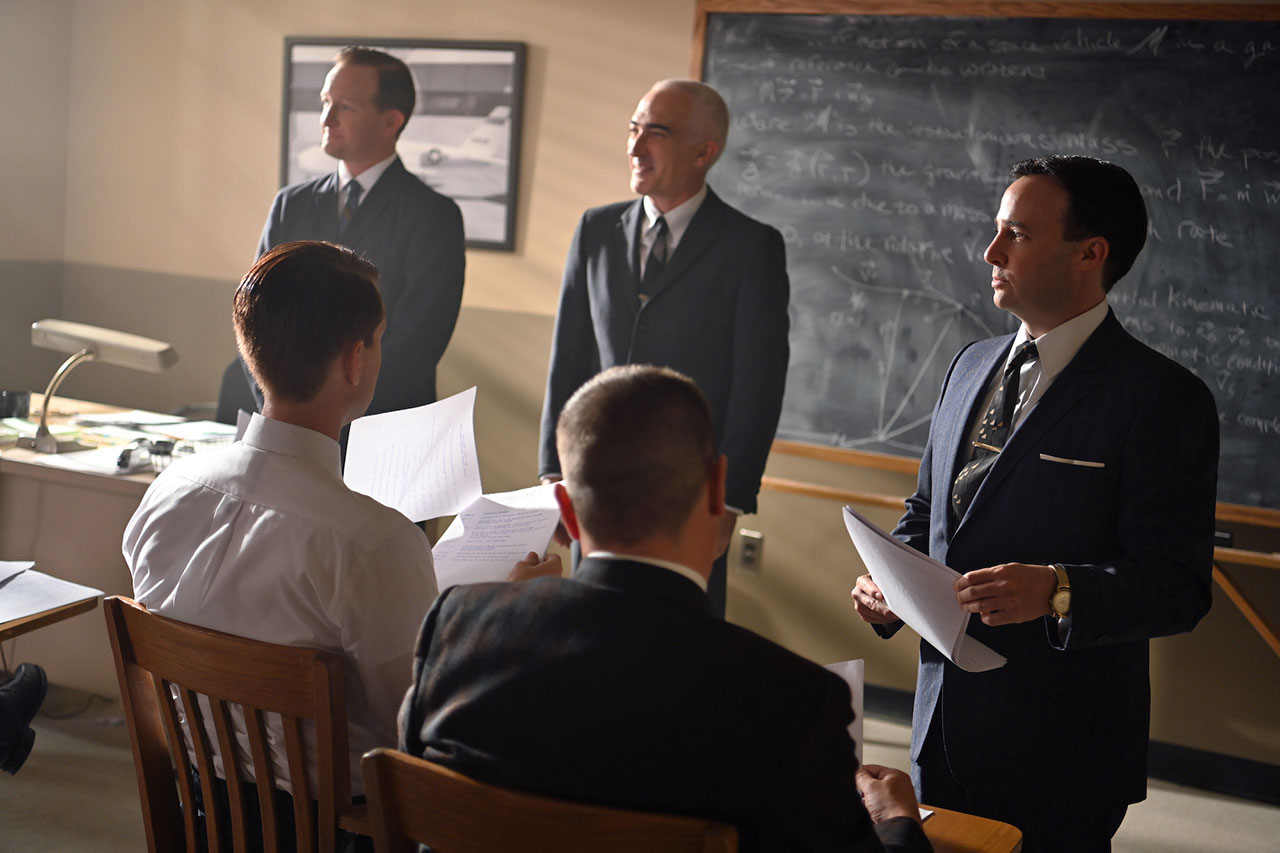
The second episode picks up where the first one left off, with the newly-named astronauts still fielding questions at the press conference. Glenn is a natural in front of the cameras, Shepard not so much.
The media's interest in the astronauts quickly follows them home. Louise Shepard (Shannon Lucio) opens her front door to find the press camped outside. Reporters struggle to keep up with Glenn as he goes for a run around his neighborhood.
Grissom and Slayton debate driving home given the media circus waiting for them and the product of their hunt, a dead black bear, in the back of Grissom's truck.
"Why did you bring that back when there are reporters everywhere?" asks Betty Grissom (Rachel Burttram) of her husband.
Another journalist sneaks his way into the Coopers' home, only to be thrown out after he gets one of their daughters to hint at the family's recent separation.
NASA Administrator Keith Glennan (Holland Hayes), a former Hollywood studio manager, has the press on his mind, too. He meets with Gilruth at the Space Task Group, who is more concerned with a series of exploding rockets and budget scrutiny from Congress than he is in making headlines. Public affairs officer John "Shorty" Powers (Danny Strong) joins them to make the case that public support translates to votes, which in turn means more money for the space agency.
To that end, the astronauts are sent on a cross-country PR tour to win the hearts and minds of the public. In Huntsville, Alabama, the Mercury 7 meet with the engineers building the Redstone rocket. At B.F. Goodrich in Akron, Ohio, they visit with the women who are sewing together their spacesuits. And in Shreveport, Louisiana, they wine and dine with members of Congress.
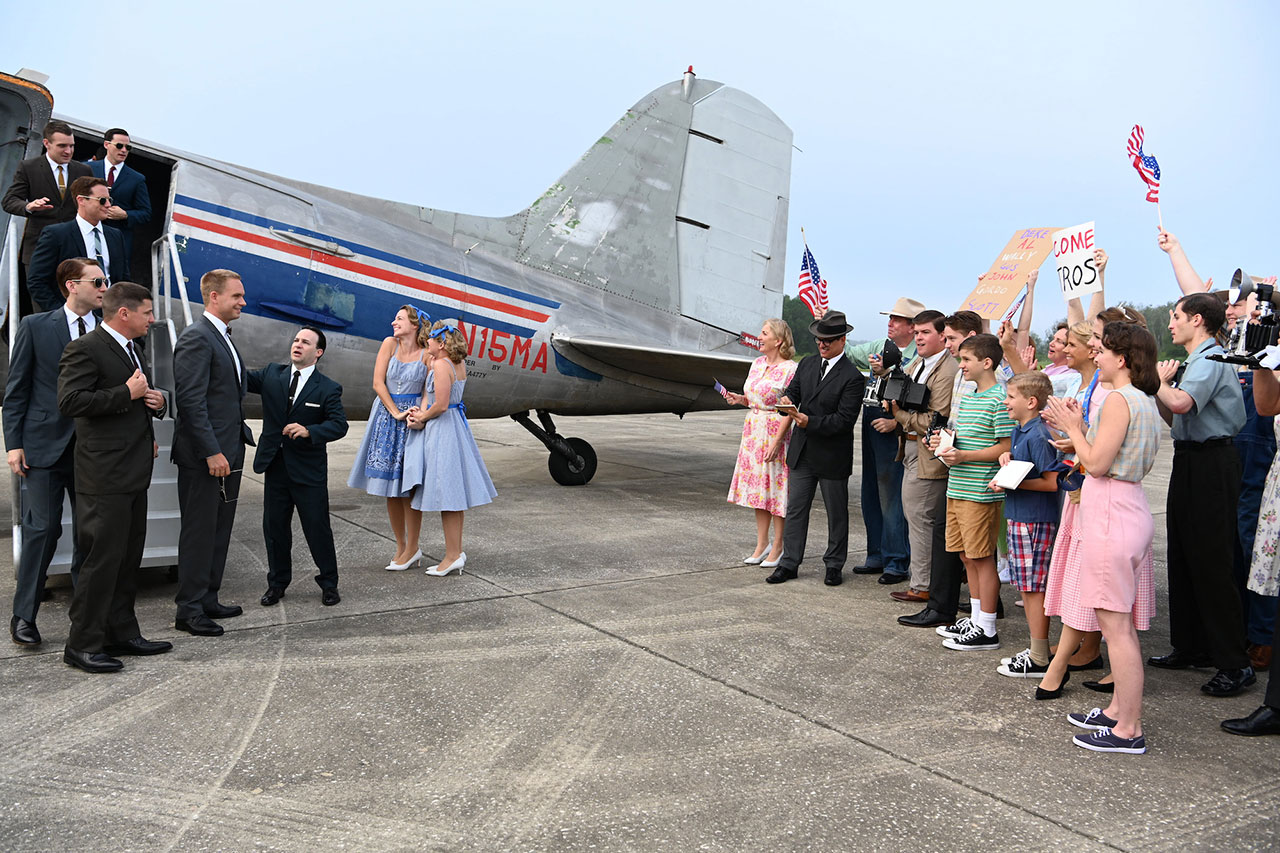
It is there that Glenn also meets Leo DeOrsey (Robert Curtis Brown), a lawyer and agent who wants to represent the astronauts. "Like it or not, you're a celebrity and what you need Mr. Glenn? Someone to stand between you and everybody looking for a piece — not to mention the press," he says.
Switching back to the Coopers, the same reporter that gave them trouble before is still camped outside their home and questioning their older daughter on her walks to school. This time, he drops a name, "Lurleen Wilson," which results in Cooper dropping him, punching him in the face.
The Coopers are not the only ones concerned about the press. Shepard worries about leaving his family to go to Florida and laments the media attention, though Louise advises, "Like it or not, this is what you signed up for, and John Glenn is good at it. So if you really want to be first, you're going to have to get used to the limelight."
Back in Washington, that limelight is causing problems for Gilruth. Contractors are complaining about the astronauts being photographed with their competitors' products, in addition to other questionable interactions. Powers pushes back, "What do you expect? They're poor. They're being treated like movie stars, while their wives are at home cooking dinner out of shoelaces."
The Glenns host the Coopers for dinner, where Cooper recounts how he and Trudy met, on the flight line, trading smiles. Trudy tells Annie about her desire to race planes again, but they cannot afford it on Cooper's salary alone. Glenn warns Cooper about how punching the reporter put the entire space program at risk. "You think it is just me? Deke, Gus, Wally, it is not like any of us went to finishing school. If this keeps up, Shorty is going to have more to worry about than just one glass-jawed reporter," Cooper says.
Glenn remembers his encounter with DeOrsey, and with Shorty's help, sets up a meeting with him and Loudon Wainwright (Josh Cooke), a writer for LIFE magazine. Using mockups that show each man on his own LIFE cover, Wainwright and DeOrsey sell the astronauts on an exclusive agreement for their stories. The deal will keep the other press away from their families, give them control over what is written and pay them $25,000 a year, three times their salaries.
"They can't even print a comma without our okay," Cooper tells Trudy. "This is a fresh start for us. Baby, we've got to get you back up in a plane!"
The Mercury 7 arrive in Florida and Hangar S at Cape Canaveral, the new home to NASA's human spaceflight program and, among other things, the astronauts' intended quarters. Shepard meets nurse Dee O'Hara (Kaley Ronayne), while the others go on to discover their living accommodations are military-style bunk beds. With one look at the situation, Shepard leads the others elsewhere.
"Al, I've really got to hand it to you. This surely beats the heck out of bunking in that hangar, and it is nice and quiet here. We've just about got the whole place to ourselves," Glenn says, as he and the others relax at the pool-side bar of the Starlite Motel in Cocoa Beach. "Oh, don't worry," says Shepard with a sly smile, "I'll fix that, too."
Back at the Shepards' home, Louise sorts through stacks of mail, including love letters to her husband.
Wainwright comes by the hotel and talks with Shepard, who is still reluctant about opening up to a reporter. "Al, my job is to ensure that the American public sees seven American heroes on the newsstand, and you, you help me craft your own story. Fact by way of fiction can bring us closer to the truth itself," says Wainwright.
At the Coopers', Trudy tends to her daughter, Camala, who crashed her bike into a car after riding with her eyes closed, reacting to thoughts of her father punching the reporter and flying high-risk test flights. Trudy tries to get her to open up and admit to seeking out a thrill, but Camala refuses.
Back in Cocoa Beach, Shepard eyes a Corvette at a local dealership. Owner Jim Rathmann makes him a deal, $1 for the car. "We're proud to have you boys down here."
Shepard, driving his new Vette with two young ladies along for the ride, comes upon Glenn and Cooper going for a run. Shepard gives Cooper Rathmann's card. "You tell Jimbo that I sent you. This is for you and all the guys. You too, John," Shepard says as he counts out dollar bills.
"The goodies are good down here, amigo."
The right, wrong and real stuff
At the start of each episode, a disclaimer appears on screen: "This dramatization, although fictionalized, is based on actual events. Dialogue and certain events and characters have been created or altered for dramatic purposes."
Here is a look at some of the right, wrong and real stuff the first two episodes portrays:
- The clock shown at the start of the first episode shows Alan Shepard and John Glenn awake but still in their beds at 2:45 a.m. on May 5, 1961. In reality, Shepard was woken at 1:10 a.m. to begin getting ready for his 9:34 a.m. launch.
- Shepard did indeed have filet mignon and eggs for breakfast, which he ate while seated with John Glenn.
- The scene showing Shepard exiting the suit-up trailer and looking up at his Mercury-Redstone 3 rocket not only matches the imagery that was captured that day, but was restaged at the actual Launch Complex 5 where the real history was made almost 60 years ago.
- As a U.S. Air Force test pilot, Cooper did fly the F-104, but his friend, Cal Cunningham, is a fictional character. The crash depicted may be an homage to the real-life F-104 crash suffered by famed aviator Chuck Yeager, which Tom Wolfe wrote about and which is depicted in the 1983 film. It may also have been this series' way to convey the dangers encountered by test pilots and why they were the choice for the nation's first astronauts.
- Glenn did achieve fame before becoming an astronaut for Project Bullet, the first supersonic transcontinental flight, which led to him appearing on the televised "Name That Tune" game show on Oct. 4, 1957, the same day the Space Age began with the Soviet's launch of the world's first satellite, Sputnik.
- Gilruth and Kraft were not directly involved in narrowing the initial list of candidates. From a pool of 508 test pilots, a three-man panel comprised of Charles Donlan, Warren North and psychologist Allen Gamble identified 110 men (including five Marines) as qualified, who were then divided into three groups. Only the first two groups were invited to the Pentagon (rather than Langley) for briefings and further screening, resulting in a list of 32 men. Gilruth oversaw the final selection, which had been planned as six, but resulted in the seven pilots chosen.
- "Just two of the best pilots who have ever lived, and they'll be the first to tell you." This may be an homage to the Philip Kaufman movie, which had Dennis Quaid, as Gordon Cooper, deliver the line, "Who was the best pilot I ever saw? Well, you're lookin' at him."
- At the real-life press conference that introduced the Mercury astronauts to the world, Shepard was not as camera shy as depicted, but Glenn was certainly the most comfortable and gave the most media-friendly replies.
- The August 1959 LIFE magazine deal that was negotiated by Leo DeOrsey was for a total of $500,000, out of which $105,000 was to be paid upon signing, $140,000 was to be paid on the completion of the first suborbital flight, $175,000 was to be paid upon completion of the first orbital flight and $80,000 was to be paid upon the end of the Mercury program. After an initial payment of $15,000 each, LIFE agreed to move up the second payment to November 1960, which gave the astronauts an additional $20,000 each.
- The Mercury astronauts did indeed find temporary residences at the Starlite Motel in Cocoa Beach, under the management of Henri Landwirth.
- Jim Rathmann was more than just a car dealer. He was also a former race car driver who won the Indianapolis 500 in 1960. Rathmann, working with General Motors, offered the astronauts a $1 lease on new Corvettes. Four of the astronauts (Shepard, Grissom, Cooper and Slayton) took the deal.
New episodes of National Geographic's "The Right Stuff" will begin streaming on Disney+ every Friday through Nov. 20. Return to collectSPACE.com for weekly recaps.
Follow collectSPACE.com on Facebook and on Twitter at @collectSPACE. Copyright 2020 collectSPACE.com. All rights reserved.
Join our Space Forums to keep talking space on the latest missions, night sky and more! And if you have a news tip, correction or comment, let us know at: community@space.com.

Robert Pearlman is a space historian, journalist and the founder and editor of collectSPACE.com, a daily news publication and community devoted to space history with a particular focus on how and where space exploration intersects with pop culture. Pearlman is also a contributing writer for Space.com and co-author of "Space Stations: The Art, Science, and Reality of Working in Space” published by Smithsonian Books in 2018.In 2009, he was inducted into the U.S. Space Camp Hall of Fame in Huntsville, Alabama. In 2021, he was honored by the American Astronautical Society with the Ordway Award for Sustained Excellence in Spaceflight History. In 2023, the National Space Club Florida Committee recognized Pearlman with the Kolcum News and Communications Award for excellence in telling the space story along the Space Coast and throughout the world.

